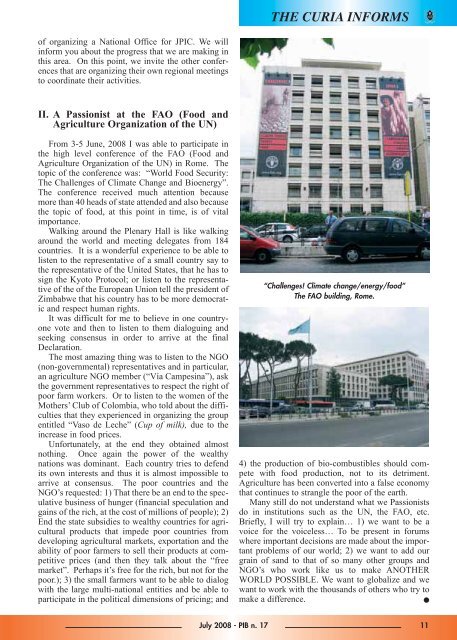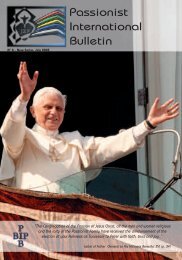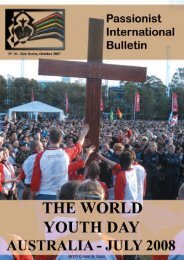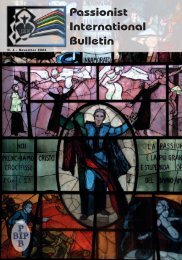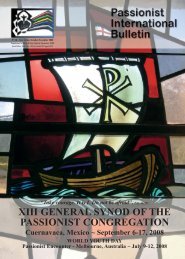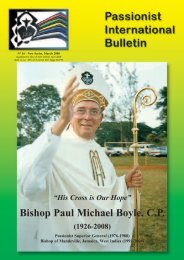the curia informs - Passio Christi
the curia informs - Passio Christi
the curia informs - Passio Christi
Create successful ePaper yourself
Turn your PDF publications into a flip-book with our unique Google optimized e-Paper software.
THE CURIA INFORMS<br />
of organizing a National Office for JPIC. We will<br />
inform you about <strong>the</strong> progress that we are making in<br />
this area. On this point, we invite <strong>the</strong> o<strong>the</strong>r conferences<br />
that are organizing <strong>the</strong>ir own regional meetings<br />
to coordinate <strong>the</strong>ir activities.<br />
II. A <strong>Passio</strong>nist at <strong>the</strong> FAO (Food and<br />
Agriculture Organization of <strong>the</strong> UN)<br />
From 3-5 June, 2008 I was able to participate in<br />
<strong>the</strong> high level conference of <strong>the</strong> FAO (Food and<br />
Agriculture Organization of <strong>the</strong> UN) in Rome. The<br />
topic of <strong>the</strong> conference was: “World Food Security:<br />
The Challenges of Climate Change and Bioenergy”.<br />
The conference received much attention because<br />
more than 40 heads of state attended and also because<br />
<strong>the</strong> topic of food, at this point in time, is of vital<br />
importance.<br />
Walking around <strong>the</strong> Plenary Hall is like walking<br />
around <strong>the</strong> world and meeting delegates from 184<br />
countries. It is a wonderful experience to be able to<br />
listen to <strong>the</strong> representative of a small country say to<br />
<strong>the</strong> representative of <strong>the</strong> United States, that he has to<br />
sign <strong>the</strong> Kyoto Protocol; or listen to <strong>the</strong> representative<br />
of <strong>the</strong> of <strong>the</strong> European Union tell <strong>the</strong> president of<br />
Zimbabwe that his country has to be more democratic<br />
and respect human rights.<br />
It was difficult for me to believe in one countryone<br />
vote and <strong>the</strong>n to listen to <strong>the</strong>m dialoguing and<br />
seeking consensus in order to arrive at <strong>the</strong> final<br />
Declaration.<br />
The most amazing thing was to listen to <strong>the</strong> NGO<br />
(non-governmental) representatives and in particular,<br />
an agriculture NGO member (“Vía Campesina”), ask<br />
<strong>the</strong> government representatives to respect <strong>the</strong> right of<br />
poor farm workers. Or to listen to <strong>the</strong> women of <strong>the</strong><br />
Mo<strong>the</strong>rs’ Club of Colombia, who told about <strong>the</strong> difficulties<br />
that <strong>the</strong>y experienced in organizing <strong>the</strong> group<br />
entitled “Vaso de Leche” (Cup of milk), due to <strong>the</strong><br />
increase in food prices.<br />
Unfortunately, at <strong>the</strong> end <strong>the</strong>y obtained almost<br />
nothing. Once again <strong>the</strong> power of <strong>the</strong> wealthy<br />
nations was dominant. Each country tries to defend<br />
its own interests and thus it is almost impossible to<br />
arrive at consensus. The poor countries and <strong>the</strong><br />
NGO’s requested: 1) That <strong>the</strong>re be an end to <strong>the</strong> speculative<br />
business of hunger (financial speculation and<br />
gains of <strong>the</strong> rich, at <strong>the</strong> cost of millions of people); 2)<br />
End <strong>the</strong> state subsidies to wealthy countries for agricultural<br />
products that impede poor countries from<br />
developing agricultural markets, exportation and <strong>the</strong><br />
ability of poor farmers to sell <strong>the</strong>ir products at competitive<br />
prices (and <strong>the</strong>n <strong>the</strong>y talk about <strong>the</strong> “free<br />
market”. Perhaps it’s free for <strong>the</strong> rich, but not for <strong>the</strong><br />
poor.); 3) <strong>the</strong> small farmers want to be able to dialog<br />
with <strong>the</strong> large multi-national entities and be able to<br />
participate in <strong>the</strong> political dimensions of pricing; and<br />
“Challenges! Climate change/energy/food”<br />
The FAO building, Rome.<br />
4) <strong>the</strong> production of bio-combustibles should compete<br />
with food production, not to its detriment.<br />
Agriculture has been converted into a false economy<br />
that continues to strangle <strong>the</strong> poor of <strong>the</strong> earth.<br />
Many still do not understand what we <strong>Passio</strong>nists<br />
do in institutions such as <strong>the</strong> UN, <strong>the</strong> FAO, etc.<br />
Briefly, I will try to explain… 1) we want to be a<br />
voice for <strong>the</strong> voiceless… To be present in forums<br />
where important decisions are made about <strong>the</strong> important<br />
problems of our world; 2) we want to add our<br />
grain of sand to that of so many o<strong>the</strong>r groups and<br />
NGO’s who work like us to make ANOTHER<br />
WORLD POSSIBLE. We want to globalize and we<br />
want to work with <strong>the</strong> thousands of o<strong>the</strong>rs who try to<br />
make a difference.<br />
●<br />
July 2008 - PIB n. 17<br />
11


